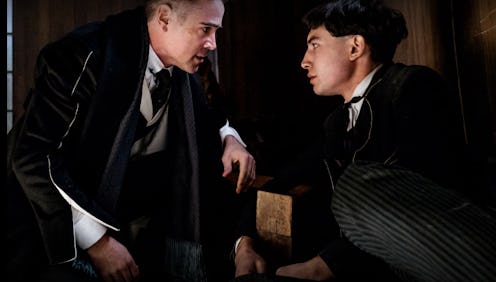Entertainment
'Fantastic Beasts' Is A Self-Acceptance Guide

The newest movie from the Harry Potter universe, Fantastic Beasts and Where to Find Them, explores the idea of what it's like to have a gift but be shamed or even deemed crazy for being "abnormal." The film focuses on the act of hiding wizardry from nomads (nonmagical citizens), and several characters are forced to keep their powers hidden, or else be ridiculed or condemned by the rest of society. Beasts is a fantasy film, of course, but watching the events of the movie unfold, I found myself strongly connecting to the idea of having to hide one's talents for fear of shame.
Fantastic Beasts follows the English character Newt Scamander (Eddie Redmayne), a magizoologist who has a rattling suitcase full of magical creatures by his side when he arrives in pre-Depression era New York City. At the time, the concrete jungle is full of protestors who want no signs of evil — aka magic — in their city, and they're petitioning to have a second Salem Witch trial. And so although Scamander's main objective is to catch a rare magical beast, he enters into the city when its declaring war on its magical residents, many of whom don't wish to be identified.
And while there, Newt also encounters Credence Barbone (Ezra Miller), a (spoiler alert) wizard in hiding. Credence has been tortured and manipulated by his foster mother into believing that all wizards are evil and that to have any curiosity about magic — or dare to have the gift — will cause the world to fall into utter disarray. As an orphan who spends most of the film being beaten with a belt, Credence is filled with gloom and fear. He's too afraid of what'll happen if his powers are discovered to ever let that happen, and so he hides his talents from everyone.
Credence's storyline resonated with me strongly, and I'm sure with others as well. How many times have you had a family member of friend tell you that a gift you have isn't good enough, or that it seems "crazy"? Far too often, other people try to dictate the trajectory of our lives, despite, or because of, talents that they don't deem worthwhile. In my family, I'm the only journalist in a group full of doctors, pharmacists, nurses, engineers and lawyers.When I said I was going to major in the arts, hell broke loose. I was told I needed to find something more stable, perhaps major in the healthcare field because money was "certain" and that "writing is a hobby,not a profession." The pushback filled me with disappointment and anger, and I went through periods of emotion where I wanted to swirl through the city like Credence.
My mind was constantly filled with a mix of defensiveness ("what do you mean I won't be successful?"), doubt ("is writing really that bad?") and short-lived resignation ("Hmm, maybe I can be a lawyer"). The judgment of my loved ones caused me to doubt myself and become timid about my gift, and while watching Fantastic Beasts, I could see all of that written on Credence's face when his mother condemned him for curiosity in magic. The whole time, I wanted to jump in the movie screen and tell him that he'd be OK and that his skills were important, despite what others might say.
Credence spends the entire final act of the film as a ball of sadness, and that spoke volumes to me. Don't let other people influence the way you look at your life or your gift. Family or friends may think that they're helping you succeed by offering criticism, but that tends to just make them feel better, not you. Besides, so much of what society deems "crazy" now will soon be acceptable later, and those attitudes shouldn't stop you from feeling confident or pursuing your beliefs. Fantastic Beasts gives a magical twist on how to deal with being different or having a special gift, and, especially during the holidays, its story couldn't resonate more.
Images: Warner Bros. Pictures, Giphy